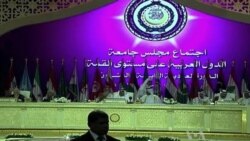CAIRO —
Syria's opposition representatives took the country's seat at an Arab summit for the first time on Tuesday, saying that the U.S. should use Patriot surface-to-air missiles to protect rebel-held areas from President Bashar al-Assad's airpower.
Opposition leader Mouaz al-Khatib said the United States should play a bigger role helping to end the two-year conflict and that he had asked Secretary of State John Kerry for U.S. forces to help defend rebel-controlled parts of northern Syria.
NATO said on Tuesday it had no intention of intervening militarily in Syria, although three NATO countries have sent Patriot missile batteries to Turkey to protect its cities from possible attack from Syria.
Syria's seat had been vacant since the Arab League suspended its membership in 2011. Most Arab League members have called for President Assad to step down.
Khatib recently resigned as head of the opposition Syrian National Coalition, but led the Syrian delegation at the two-day summit in Qatar at the invitation of that country's emir.
Arab leaders, diplomats and delegates applauded as Qatar's ruler, Sheikh Hamad bin Khalifa al Thani, officially handed the Syrian government's seat at the summit to Khatib.
Doha pushed for recognition of the opposition, despite objections of several Arab League members.
Syria slams move
Syrian government media slammed the move, saying it went against the spirit of the Arab League charter. A government daily newspaper called the decision "shameful" and accused the league of adopting what it called a "Zionist-American" position.
Despite discord and division within the opposition, Khatib delivered an impassioned address to the gathering, saying that he spoke for many Syrians who have been victimized during the two-year-old conflict.
Khatib said he saluted the summit in the name of a brave people, many of whom are now homeless, imprisoned, or who gave their lives to defend freedom.
Khatib accused the Syrian regime of torturing young men, imprisoning women and children, bombing bakeries as families waited to buy bread, and using planes and missiles to attack them. He also blasted the international community for watching without taking action.
Other speakers, including Arab League Secretary-General Nabil al-Arabi and Turkish Foreign Minister Ahmet Davutoglu, urged nations to take stronger action to protect the Syrian people against what they termed the Assad government's relentless military onslaught.
But Iraqi representative Khudayr al-Khuzai urged the gathering to find a "peaceful, political solution" to the Syrian conflict and to condemn what he called "outside meddling" in the fighting.
Qatar's influence
Syria's opposition has the backing of Qatar which is providing material and political support, including to hardline Islamists also fighting Syrian government forces.
Some analysts believe Qatar, whose wealth has also helped Arab Spring forces in Libya and Egypt, puts a wild card into play.
"Because Qatar is such a new player in the region, given its aspirations, it's difficult to know precisely what they are doing," said Christian Donath, a political analyst at the American University in Cairo.
VOA's Mark Snowiss contributed to this report from Washington.
Opposition leader Mouaz al-Khatib said the United States should play a bigger role helping to end the two-year conflict and that he had asked Secretary of State John Kerry for U.S. forces to help defend rebel-controlled parts of northern Syria.
NATO said on Tuesday it had no intention of intervening militarily in Syria, although three NATO countries have sent Patriot missile batteries to Turkey to protect its cities from possible attack from Syria.
Syria's seat had been vacant since the Arab League suspended its membership in 2011. Most Arab League members have called for President Assad to step down.
Khatib recently resigned as head of the opposition Syrian National Coalition, but led the Syrian delegation at the two-day summit in Qatar at the invitation of that country's emir.
Arab leaders, diplomats and delegates applauded as Qatar's ruler, Sheikh Hamad bin Khalifa al Thani, officially handed the Syrian government's seat at the summit to Khatib.
Doha pushed for recognition of the opposition, despite objections of several Arab League members.
Syria slams move
Syrian government media slammed the move, saying it went against the spirit of the Arab League charter. A government daily newspaper called the decision "shameful" and accused the league of adopting what it called a "Zionist-American" position.
Despite discord and division within the opposition, Khatib delivered an impassioned address to the gathering, saying that he spoke for many Syrians who have been victimized during the two-year-old conflict.
Khatib said he saluted the summit in the name of a brave people, many of whom are now homeless, imprisoned, or who gave their lives to defend freedom.
Khatib accused the Syrian regime of torturing young men, imprisoning women and children, bombing bakeries as families waited to buy bread, and using planes and missiles to attack them. He also blasted the international community for watching without taking action.
Other speakers, including Arab League Secretary-General Nabil al-Arabi and Turkish Foreign Minister Ahmet Davutoglu, urged nations to take stronger action to protect the Syrian people against what they termed the Assad government's relentless military onslaught.
But Iraqi representative Khudayr al-Khuzai urged the gathering to find a "peaceful, political solution" to the Syrian conflict and to condemn what he called "outside meddling" in the fighting.
Qatar's influence
Syria's opposition has the backing of Qatar which is providing material and political support, including to hardline Islamists also fighting Syrian government forces.
Some analysts believe Qatar, whose wealth has also helped Arab Spring forces in Libya and Egypt, puts a wild card into play.
"Because Qatar is such a new player in the region, given its aspirations, it's difficult to know precisely what they are doing," said Christian Donath, a political analyst at the American University in Cairo.
VOA's Mark Snowiss contributed to this report from Washington.






